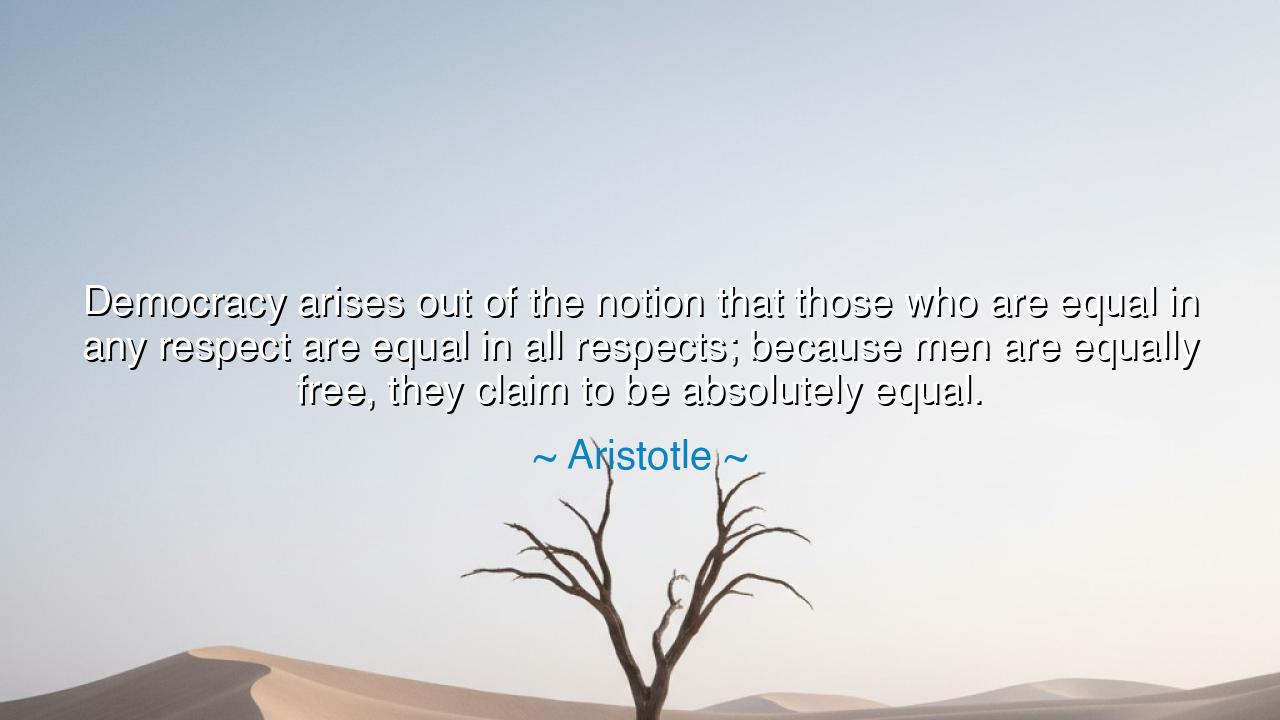
Democracy arises out of the notion that those who are equal in
Democracy arises out of the notion that those who are equal in any respect are equal in all respects; because men are equally free, they claim to be absolutely equal.






“Democracy arises out of the notion that those who are equal in any respect are equal in all respects; because men are equally free, they claim to be absolutely equal.” Thus spoke Aristotle, the great philosopher of ancient Greece, whose mind spanned both heaven and earth. In this profound observation, he warns us of the paradox of equality—that when men mistake one kind of equality for all kinds, the harmony of society begins to tremble. For though all are born with the same right to freedom, not all are equal in wisdom, virtue, strength, or understanding. And yet, when liberty blinds the soul with pride, the people forget this truth, and the balance that sustains democracy begins to waver.
The origin of this thought lies in the Athens of Aristotle’s time—a city radiant with art, reason, and freedom, yet often torn by the very forces that freedom unleashes. He had seen the rise and fall of the Athenian state, where democracy in its splendor sometimes gave way to chaos, when the citizens, forgetting moderation, claimed equality not only before the law but in every sphere of life. To Aristotle, this was the seed of disorder: when each man believes his opinion as wise as the philosopher’s, his impulse as noble as the statesman’s, his desire as just as the lawgiver’s, then governance collapses into vanity. Thus, he taught that democracy, while the fairest of systems, must be guided by reason, humility, and the recognition that equality of freedom does not mean equality of ability.
The philosopher’s warning is not born of arrogance but of reverence for order. Aristotle understood that every society, like the body, depends upon the proper function of its parts. The head cannot say to the hand, “You are equal to me in judgment,” nor the foot to the eye, “I shall lead where I please.” Freedom gives life to the whole, but the whole survives only when each part honors its natural place. So too with man: to be equally free is not to be equally wise, and when men confuse the two, liberty becomes license, and license becomes ruin. Democracy, therefore, must rest upon balance—the equilibrium between freedom and responsibility, equality and virtue, rights and reason.
History, too, has proven Aristotle’s wisdom. Consider the tale of the French Revolution. It began with noble cries for liberty, equality, and fraternity—the sacred triad of democracy. But soon, the passion for equality grew wild and unchecked. The people, once united against tyranny, began to turn upon themselves. Each man, claiming equal power and equal right, trusted his own passion above the rule of law. In the name of equality, they built the guillotine; in the name of freedom, they drowned their nation in fear. What began as the dawn of democracy became the night of terror. Here was the truth of Aristotle’s warning fulfilled: when men believe that equality of freedom means equality of judgment, society collapses into chaos, and freedom devours itself.
Yet within this caution lies also a message of hope. For Aristotle did not condemn democracy—he sought to perfect it. He saw in it the highest expression of human dignity, for it honors the free will that distinguishes man from beast. But he knew that democracy must be tempered by virtue. True equality lies not in making all men alike, but in giving each the same right to fulfill his nature, to serve according to his gifts, to rise by merit, not by demand. A just society, therefore, is one that gives to each man the freedom to strive and the wisdom to respect the limits of his understanding.
And so, my listener, this teaching comes to you not as a relic of philosophy but as living guidance. Guard your freedom, but do not let pride turn it into blindness. Honor equality, but know that sameness is not justice. In your home, your nation, and your heart, remember that freedom without humility becomes arrogance, and equality without wisdom becomes folly. If you would keep democracy strong, seek not to make all men identical, but to make all men equally honorable, equally accountable, and equally bound to virtue.
Thus, the words of Aristotle endure like the pillars of an ancient temple: steadfast against time, speaking to every age that dares to call itself free. He reminds us that democracy is not a gift to be possessed, but a discipline to be practiced. It flourishes not by the loudness of the crowd, but by the steadiness of the wise. Let this be the lesson: equality is sacred, but it is sacred because it rests upon truth—and truth, like freedom itself, demands both humility and strength. When men remember this, democracy will not decay, but endure, shining as the harmony of liberty and order, of freedom and reason, of man and his eternal striving toward the good.






AAdministratorAdministrator
Welcome, honored guests. Please leave a comment, we will respond soon